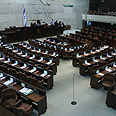
After many years, the results of the elections for the 19th Knesset have provided the opportunity to establish a broad civil coalition that does not lean on sectoral parties and can take far-reaching measures for the State of Israel. The list of necessary reforms is undoubtedly long, but changing the system of government must be at the top of the list of priorities.
The issue has been a long-standing source of public and political debate, but for years an agreement on changing the system could not be reached, mainly due to the pressure from the small and sectoral parties, which feared that such a change would decrease their power. But the recent elections seem to have provided an opportunity to finally implement this crucial reform, and the heads of the various parties have identified this window of opportunity.
Apart from Knesset members Yair Lapid and Shaul Mofaz, who called for changing the system during their election campaign, Prime Minister Netanyahu and MK Lieberman have also discussed the importance of this reform in recent weeks. Hatnua Chairwoman Livni also supports the initiative.
While the political map does give hope that it will be possible to change the system of government, the election results underscore the failures of the current system. If until the 1980s the ruling parties won some 45 Knesset seats on average, the number dropped to around 30 in the past decade.
In the recent elections, despite the merger of the leading factions in the rightist bloc, Likud-Beiteinu barely gained one-fourth of the seats in parliament. The second largest party, Yesh Atid, did not cross the 20-mandate threshold. Combined, the two largest parties did not win even half of the Knesset seats. Once again we got a torn Knesset with numerous parties. This situation makes it difficult to form a stable coalition and threatens to put sectoral needs before national interests.
To deal with the existing failures of the government system, three organizations - Israel's Hope, the Citizens' Empowerment Center in Israel and Save Israeli democracy – have drafted a joint proposal calling for:
1. Raising the electoral threshold to 4%.
2. Determining that the prime minister is the head of the largest party.
3. Incorporating an element of regional elections.
4. A special majority to disperse the Knesset.
5. Limiting the number of ministers and determining that MKs appointed to serve as ministers would not be allowed to serve in both positions simultaneously, and therefore would be forced to resign from parliament.
Adopting these clauses would solve most of the problems stemming from the current system of government. This plan will reduce the number of parties and pave the way for the establishment of two main factions. In addition, it would make it more difficult for the smaller parties to "extort" the larger ones and, most importantly, it would increase the stability of the ruling system.
The recent elections have given us a real opportunity to change the system of government and lead Israel toward a system that will allow for stability and worthy governance; a system that would help the State of Israel deal with the numerous challenges that lie ahead. Such a system would also help restore the public's trust in Israeli politics and politicians.
Meir Dagan is the chairman of Israel's Hope and is a former Mossad director















